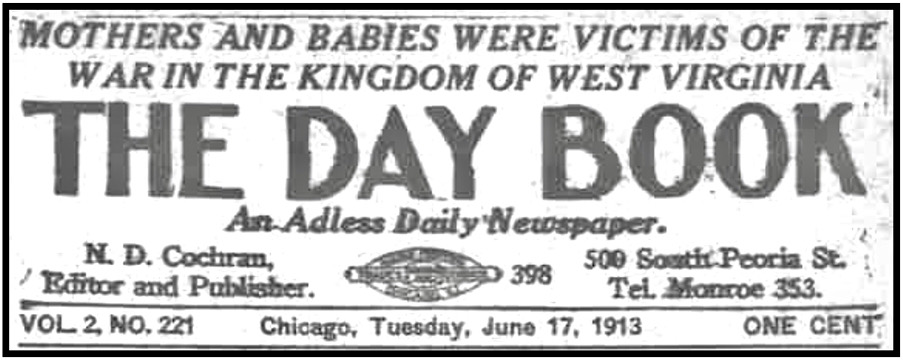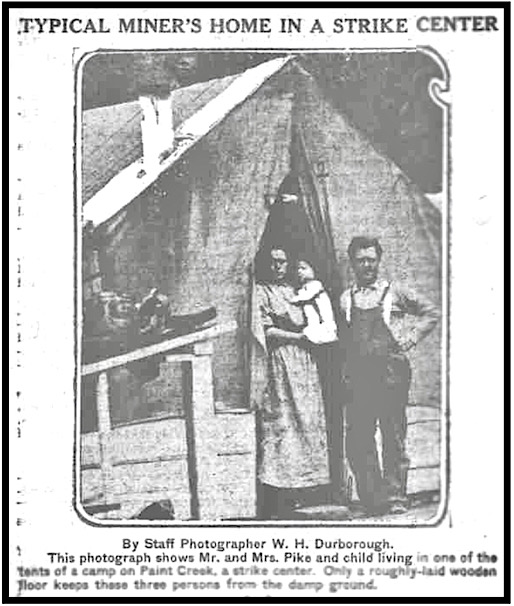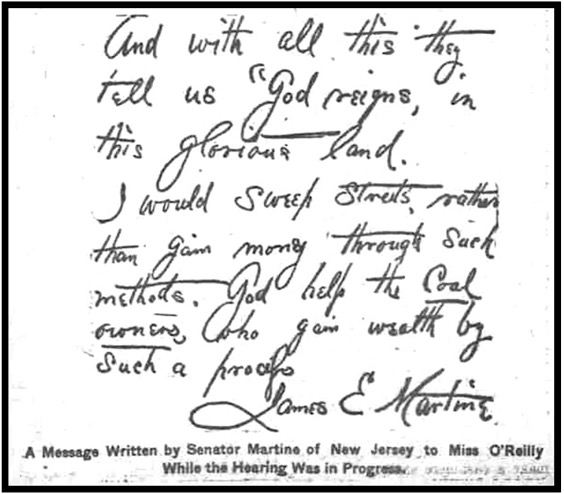 —————
—————
Hellraisers Journal – Wednesday June 18, 1913
Charleston, West Virginia – Wives of Miners Testify before Senate Committee
MOTHERS AND BABIES WERE VICTIMS OF THE WAR
IN THE KINGDOM OF WEST VIRGINIA
By Mary Boyle O’Reilly.
Charleston, W. June 17.-The laws of war among all civilized nations and most savage tribes prescribe the removal of all women and children from the peril of the firing line.
For a year West Virginia has been in a state of war, the war of the twentieth century struggle of workers and organized capital.
The U. S. Senate sub-committee on labor, now hearing testimony concerning the Paint Creek coal mine war, sits in a long, low banquet room in the Kanawha Hotel here. Pale blue walls without, decoration, cheap deal tables for the committee and the various counsel, indicate the grim business-like atmosphere of the place.
The room is crowded to suffocation with blue-shirted miners, standing, for once, shoulder to shoulder, with burly railway detectives and rat-faced mine guards whose hunched-up coats indicate the holsters holding loaded arms.
About the tables on either side gather the opposing counsel the sleek, tame solicitors of great coal corporations summery in pale gray and fawn-colored clothes; the half-dozen alert, coatless young lawyers of the United Mine Workers of America whose team-work under their chief, Judge Monnett, former attorney general of Ohio, is the one bright spot in the proceedings.
And at the committee table, facing the room, sit the senators-Martine, the living portrait of a cavalier, whose tongue is a rapier; Swanson, the senator long on corporation concern, but short on human sympathy, and Kenyon of Iowa, on whose calm judgment the troubled citizens of Kanawha county instinctively have their hope.
* * * * * * *
[Friday, June 13th, afternoon session:] The packed hearing room was insufferably hot. Long, familiar evidence dragged. A witness testifying of outrages perpetrated on unoffending strikers by the coal corporations mine-guards used the word, “Thugs.” A florid “company counsel” protested. A junior among the miners’ lawyers seemed to acquiesce. Then-
“Mrs. Parker,” he called.
“Mrs. Estep-Mrs. Seville.”
They came at once-three miners’ wives, typical women of the coal valleys, arid tidy and self-respecting, in heavy, long-sleeved shirtwaist belted with pleated alpaca skirts.
There was indescribable pathos in their work-worn, ungloved hands, their simple, home-trimmed hats.
Senator Martine leaned forward.
“Madam, you swear to speak the truth, the whole truth, nothing but the truth?”
“Indeed, do, sir”-and Mrs. Georgia Parker took the witness chair.
“I am the wife of C. C. Parker of Lamont, on Cabin Creek,” she said, diffidently. “My husband is a miner. We have-I mean -‘had’ a baby. It died.
“On February 21st, at noon, a neighbor, Mrs. Nance, and my sister Hattie Workman, started with me to Red Warrior cemetery. I wanted to fix my baby’s grave. At Lunwood mine Guard Jackson stopped us, throwing up his gun and twisting Mrs. Nance around. We told him about my baby’s grave, but-but-it made difference.”
Quietly the witness stepped aside. An” ominous mutter voiced the comment of the audience.
“Mrs. Estep-” An instant and she was there, the wife-no, the widow-of Francesco Estep, an un-armed striker shot from the C. 0. armored train at Holley Grove.
“My name is Maud Estep. My husband, Francesco Estep, a miner, was killed on the night of February 7th, between 10 and 11 o’clock.
“We lived on Paint Creek near the swinging bridge. That night we were talking and laughing in the house when Frank heard the armed train coming. There were no lights in the train, but the Gatling guns it carried sent out sheets of fire. Mine guards, under a man named Lentz, worked those guns.
“My Frank called us all to get into the cellar. I carried my year-old baby and another-unborn. My husband stood at the bulkhead, warning me not to fall. A shot from the train killed him.
“I saw no shooting from the town. That night I took my baby and went away. I never went back.”
A sound like a groan swept the listening audience.
Alone, in her pathetic mourning, the widow stepped aside and went back to her loneliness.
“Mrs. Seville, Mrs. Seville.
A worn and worried woman sank nervously into the witness chair.
“Sirs, my name is Gianiana Seville, wife of Tony Seville, a miner,” she’ spoke up. “We have four children. I expected a baby in four months. Our house was company property at Banner Hollow in Paint Creek. We left because we were afraid mine guards would kill US after what happened.” The whispering voice sank into silence.
Senator Martine, tense with indignation and pity, silently pounded the table with his fist.
Senator Kenyon, standing with hands clenched on his chair back, leaned forward gravely. All that a man feels for women in pain sounded in his quiet voice.
“Mrs. Seville, were you ever mistreated by mine guards'” he asked. The tense face responded to unspoken sympathy.
“Yes, sir-I mean Senator,” said Mrs. Seville, humbly. “On the 10th day of January I got up out of bed to hear some shooting. I saw the mine guards coming down the hill. Those mine guards were going into neighbors’ houses. They began to pick the men they could find. They had Winchester rifles. Then they came into our house and looked under the bed. My baby was asleep on the bed. I told the guards to let my baby alone.
“Then they struck me. I fell down and they hit me with their fists and kicked me. Tony cried out what shape I was in, but a mine guard hit Tony with the butt of his gun. There were twenty-nine guards. Only two hit me. I do not know why. We had done nothing. After that I was sick all the time until August. When my baby was born it was dead.”
No sound broke the silence. The innermost circle of capital in anarchy had been reached. As if dazed, Mrs. Gianiana Seville rose from the witness chair. Instantly a path opened for her through the awed throng. Watched by two hundred grim-faced strikers, she passed out of the room, the bereft mother of a baby victim who found life too cruel in a capital-throttled state and so slipped silently away.
In the name of the law!
[Emphasis added.]
~~~~~~~~~~~~~~~~~~~~~~~~~
SOURCES & IMAGES
Quote from Poem for Striker’s Orphan Child by Walter Seacrist
http://www.wvgw.net/wvcoal/estep.html
The Day Book
(Chicago, Illinois)
-June 17, 1913
https://chroniclingamerica.loc.gov/lccn/sn83045487/1913-06-17/ed-1/seq-1/
See also:
Mary Boyle O’Reilly (1873-1939)
https://en.wikipedia.org/wiki/Mary_Boyle_O%27Reilly
Conditions in the Paint Creek District, West Virginia. Volume I
Friday June 13, 1913, Afternoon Session
Hearings before a subcommittee of the Committee on Education and Labor, United States Senate, Sixty-third Congress, first session, pursuant to S. res. 37, a resolution authorizing the appointment of a committee to make an investigation of conditions in the Paint Creek district, West Virginia [June 2-Oct. 29, 1913]
(search with last names from article above)
https://babel.hathitrust.org/cgi/pt?id=nyp.33433004194795&view=2up&seq=13
Tag: Francis Estep
https://weneverforget.org/tag/francis-estep/
Tag: Maud Estep
https://weneverforget.org/tag/maud-estep/
Tag: Senate Investigation of Paint Creek Coal Fields of West Virginia of 1913
https://weneverforget.org/tag/senate-investigation-of-paint-creek-coal-fields-of-west-virginia-of-1913/
Tag: Paint Creek-Cabin Creek Strike of 1912-1913
https://weneverforget.org/tag/paint-creek-cabin-creek-strike-of-1912-1913/
~~~~~~~~~~~~~~~~~~~~~~~~~
Coal Miner’s Grave · Hazel Dickens



